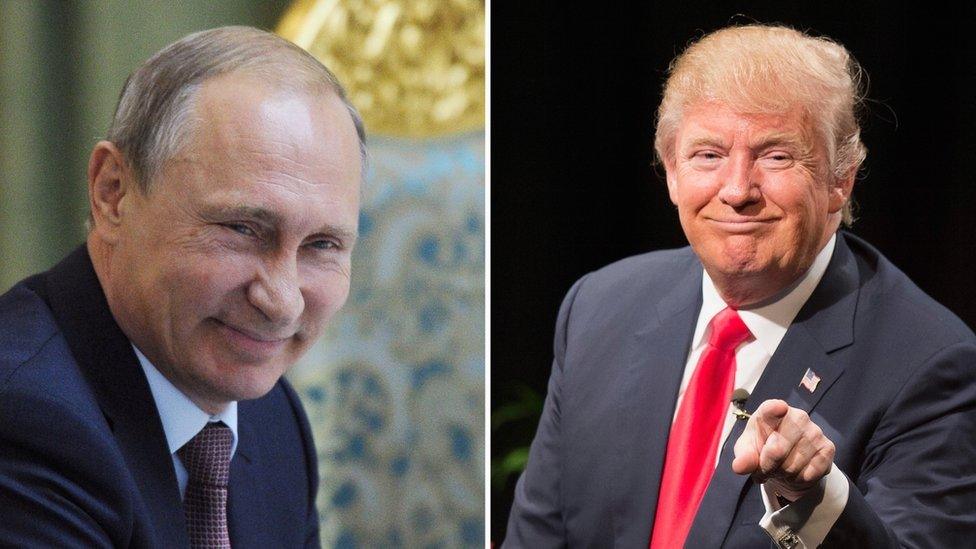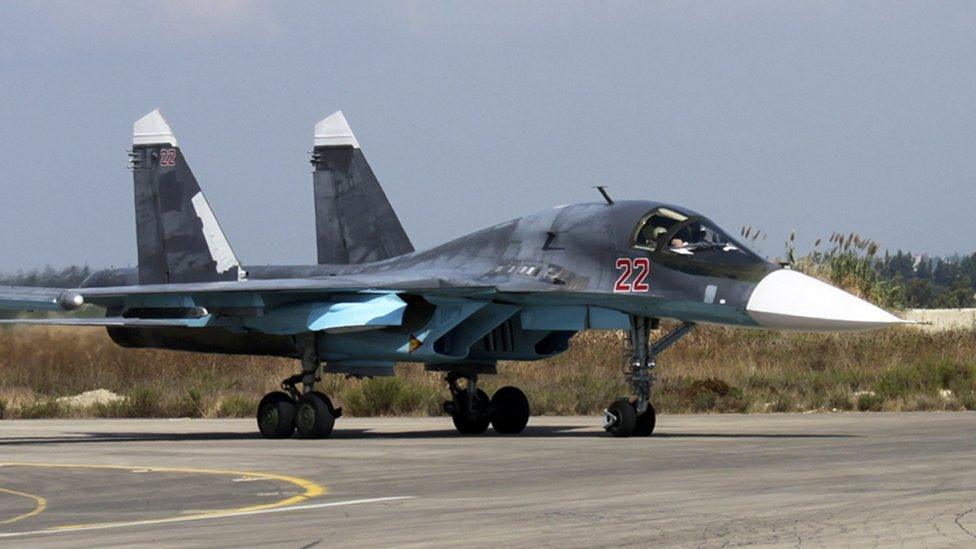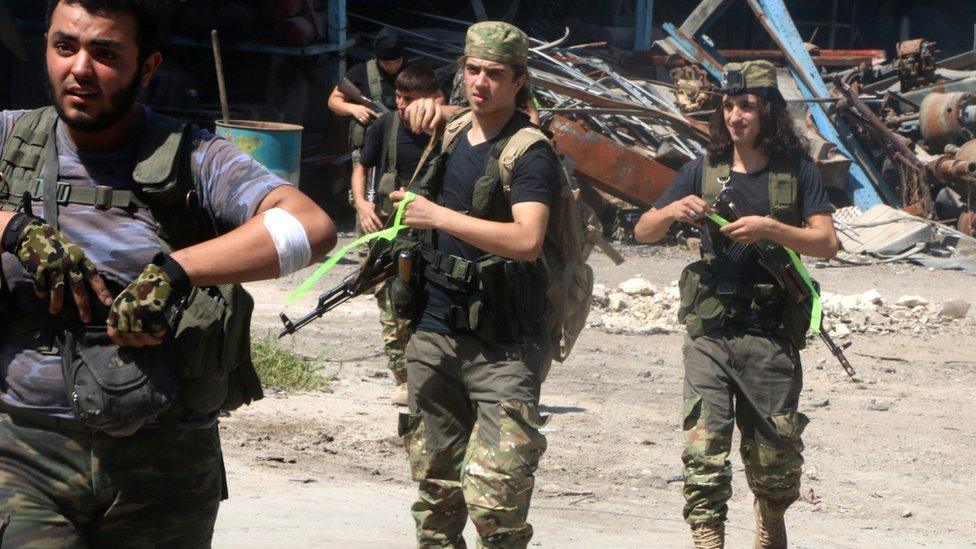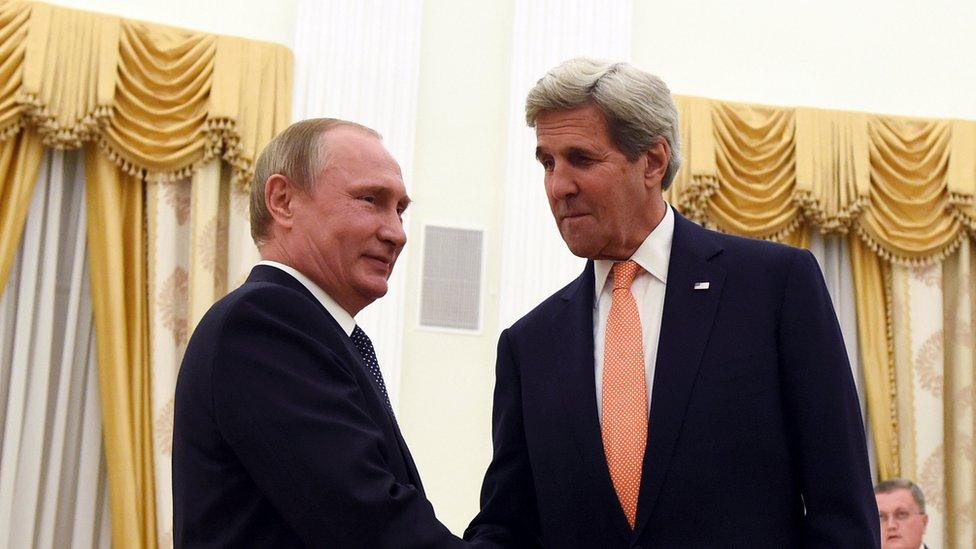Could Trump and Putin work together over Syria?
- Published

Donald Trump says if he becomes the next US president, he would like to "get together with Russia" to "knock the hell out of Isis".
His keenness to cooperate with Vladimir Putin against the so-called Islamic State group in Syria has provoked consternation and outrage among many, both Democrats and Republicans.
The spokesman for House of Representatives, Speaker Paul Ryan, a Republican, has summed up a common attitude by saying simply: "Russia is a global menace led by a devious thug."
But, despite the chill between the two countries on a raft of other matters, are Russian and American interests in Syria really so far apart?
Since the beginning of the Syrian war five years ago, the Kremlin has steadfastly supported its long-term ally President Bashar al-Assad.
That has put Russia at direct loggerheads with the US.
Back in 2011, Barack Obama said President Assad's resignation was a precondition for any settlement.
But the growing threat from IS, which has conquered large swathes of northern and eastern Syria since 2013, has changed the equation.
Last September, Russia took much of the world by surprise by intervening directly in Syria, bombing what it called terrorist targets.
Most Western politicians and foreign policy analysts said that was just a pretext to cover a cynical Kremlin power play.
They said fighting terrorism was far from Russia's main concern.
Mr Putin, they said, had intervened to shore up Mr Assad and re-establish Russia as a major player in the Middle East.

Russia has denied its air strikes have targeted Syrian civilians or opposition groups
Other aims, they said, were to distract the West's attention from Russia's support for rebels in Ukraine, to test and show off new Russian weaponry, to boost Mr Putin's popularity at home - and even to destabilise Europe by triggering a further exodus from Syria, what some called "weaponising refugees".
Some Russian air strikes seemed to confirm those suspicions.
Many have targeted not IS, but other Syrian opposition fighters supported by the West.
Evidence provided by human rights groups also suggests Russia has hit hospitals and other civilian targets, even returning for second strikes against rescue workers.
But Russia denies that.
It says it has a very real interest in combating terrorism.
Since 2001 about 1,000 of its citizens been killed in attacks blamed on Islamist extremists.
IS has established cells across Russia's predominantly Muslim north Caucasus region.
It is sending fighters north from Afghanistan to destabilise Russia's neighbours in Central Asia.
And Russia says it has hit IS in Syria harder than America has.
he US-led bombing campaign began a year earlier than Russia's, but achieved little in that time.
By late February this year, Russia was hitting about 60 targets daily; the US-led coalition about seven.
Russia has struck IS and other extreme Islamist groups such as the Nusra Front, until recently allied to al-Qaeda, many times.
And in March, Russian military backing enabled Syrian government forces to drive IS out of the historic desert town of Palmyra, the first big defeat for the extremists in Syria.
Of course, that also gave a victory to President Assad.
And more recently Russian air strikes helped his forces encircle what was once Syria's biggest city, Aleppo.
Rebels there are now fighting desperately to lift the siege.

Free Syrian Army fighters in an area south-west of the city of Aleppo
But while the West insists President Assad is the cause of Syria's problems, Russia says any likely alternative to him would be far worse.
It points to the disastrous results of overthrowing the dictators Saddam Hussein in Iraq and Muammar Gaddafi in Libya, two countries where a vacuum of authority has let IS and other extremists establish themselves.
The Kremlin also questions how moderate the so-called "mainstream rebels" in Syria really are.
Many of the other main groups besides IS and Nusra, now renamed Jabhat Fateh al-Sham, are also fighting for a Sharia-run Islamic state.
Even parts of the Free Syrian Army (FSA), which says it wants a pluralistic Syria, have sometimes cooperated with Nusra.
And US military chiefs believe the FSA includes many fighters whose views do not fit Western definitions of "moderation".
All this, Russia says, explains the West's half-hearted support for the Syrian opposition, which it has partially trained and equipped, but never substantially armed.
America - unlike Russia - appears not to know what it wants in Syria.
But it has taken Donald Trump - the great iconoclast - to shout that in public.
As he has said now more than once, "Assad is bad" but the Obama administration has been "backing people who they don't know who they are".
In fact, the idea of a Russian-American alliance against extremism is not new.
The two powers cooperated well during the US invasion of Afghanistan in 2001, after the 9/11 attacks.

John Kerry says he has reached an outline deal with Russia over the targeting of air strikes in Syria
And last October, Russia says, it invited the US, the UK and Turkey to coordinate action against IS in Syria, but the West ruled that out then because President Assad was also involved, and it feared any intelligence it passed on about anti-IS fighters in the FSA would actually be used to target them.
Now though, after long discussions in Moscow, US Secretary of State John Kerry says he has reached an outline agreement with Russia on coordinating air strikes.
The US would share intelligence in return for a Russian promise not to hit US-backed groups.
But many in Washington doubt the Kremlin could be trusted.
And some would regard any agreement with Russia as a betrayal of the forces the US has supported for the past five years.
It might take a Trump presidency - if there ever is one - with a different set of priorities, to make a US-Russia deal stick.
Would that mean defeat not just for IS, but for all President Assad's enemies? A gloating, vengeful triumph? Or, perhaps, an opening for genuine compromise imposed by both powers?
Certainly, the deal would be a U-turn for America, humiliating for many.
Its Syria policy would become less ethical - but also, perhaps, less contradictory.